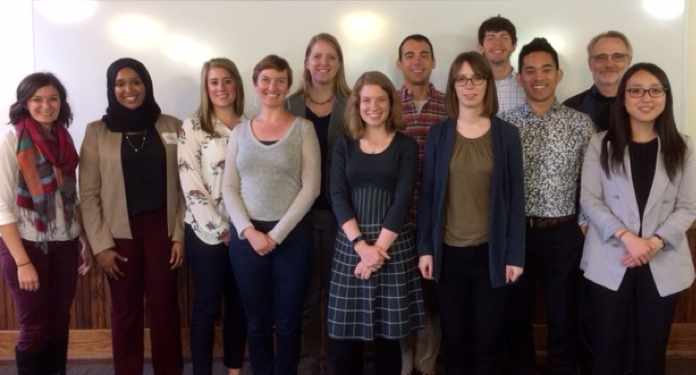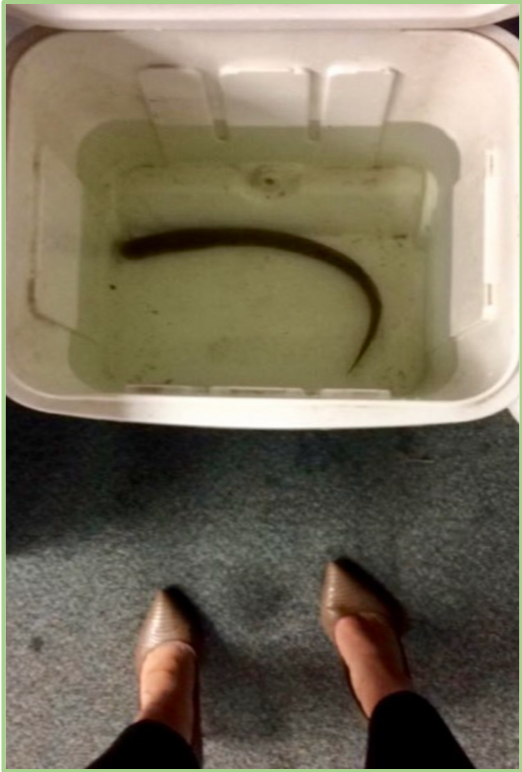Core Competency #5: Assessing Student Learning
*This core competency must be satisfied by completing the mentored teaching experience
Future Academic Scholars in Training (FAST) Fellowship
In March 2016, I was awarded a FAST (Future Academic Scholars in Teaching) Fellowship through the Center of Integration, Research, Teaching, and Learning (CIRTL), supported by the National Science Foundation. The fellowship program provides opportunities for high-achieving graduate students to engage in professional development through a mentored teaching experience, participation in relevant workshops and seminars, and exposure to current materials on teaching and assessment techniques.
During the course of a year (2016-2017), I met with other FAST Fellows and steering committee members weekly to discuss topics in STEM (science, technology, engineering, and math) fields as they relate to teaching and learning.
I the fall of 2016, I worked with my FAST mentor, Dr. Rique Campa, Associate Dean in the Graduate School and Professor of Wildlife Ecology at Michigan State University, to develop and implement a TAR (Teaching-As-Research) project in an introductory course in the Department of Fisheries and Wildlife.
During the course of a year (2016-2017), I met with other FAST Fellows and steering committee members weekly to discuss topics in STEM (science, technology, engineering, and math) fields as they relate to teaching and learning.
I the fall of 2016, I worked with my FAST mentor, Dr. Rique Campa, Associate Dean in the Graduate School and Professor of Wildlife Ecology at Michigan State University, to develop and implement a TAR (Teaching-As-Research) project in an introductory course in the Department of Fisheries and Wildlife.
Description of Core Competency
The fifth competency can be expressed through a person’s willingness to use, and interest in using, assessments to evaluate his or her students to see if they have successfully achieved learning goals. Assessments, formative and summative, provide useful data for both educators and students. For example, assessments can help educators become aware of students who may be struggling with the material or who need extra help. Assessments can help students recognize their own strengths and weaknesses in terms of the material. This competency can be mastered by making a sincere effort, as a developing educator, to routinely and consistently implement assessment strategies in a classroom setting, or at least allow for some way to gather feedback from an educator’s students, and vice versa.
Relevant topics to this area of competency include: testing, grading, and a variety of assessments (both formative and summative).
Relevant topics to this area of competency include: testing, grading, and a variety of assessments (both formative and summative).
Workshop and Seminar List
"Certification in College Teaching Institute: Assessing Student Learning"
- Date(s): May 13, 2016
- Course Instructor(s): Tammy Long, Ph.D.
- Offered By: Michigan State University
Artifact(s) and Artifact Rationale(s)
"Certification in College Teaching Institute: Assessing Student Learning"
- This is the agenda for the two-day Certification in College Teaching Institute, hosted by The Graduate School at Michigan State University.
- This reflective worksheet includes my lessons learned, thoughts, and questions after participating in the “Assessing Student Learning” session of the Certification in College Teaching Institute.
- This reflective worksheet includes my thoughts and questions after brainstorming with a partner about my mentored teaching project.
- These are the notes I took during the “Assessing Student Learning” session of the Certification in College Teaching Institute.
Summary of Mentored Teaching Experience
Pedagogical effects on student learning and satisfaction in an introductory fisheries and wildlife course
IRB # i052276, x16-1134e
In many college and university introductory-level fisheries and wildlife courses, professors commonly feature guest instructors in their course to provide an expert-level summary of a topic, which may relate to broader student learning objectives of any given course. Professors can use guest instructors in other ways, too, for instance, in order to cover an array of diverse topics or illustrate the breadth of future career opportunities for developing professionals. Though guest instructors often share relevant information with students during their class periods, it is uncertain how their teaching styles or pedagogical approaches impact student learning and satisfaction in the classroom. To address this, my teaching mentor (Dr. Rique Campa) and I observed and analyzed teaching styles and strategies in an introductory fisheries and wildlife course in the Department of Fisheries and Wildlife at Michigan State University during the fall of 2016. In this course, we categorized teaching styles and strategies among guest instructors (1 graduate student, 15 university professors, and 4 state and federal agency professionals) and measured learning and satisfaction among 96 undergraduate students from different academic backgrounds (44% Fisheries and Wildlife majors, 56% non-majors). This study reveals that many teaching style and instruction strategy factors directly impact student learning and satisfaction in negative and positive ways. These findings yield critical information for professors and frequent guest instructors who are eager to improve the efficacy of their instruction in the classroom.
IRB # i052276, x16-1134e
In many college and university introductory-level fisheries and wildlife courses, professors commonly feature guest instructors in their course to provide an expert-level summary of a topic, which may relate to broader student learning objectives of any given course. Professors can use guest instructors in other ways, too, for instance, in order to cover an array of diverse topics or illustrate the breadth of future career opportunities for developing professionals. Though guest instructors often share relevant information with students during their class periods, it is uncertain how their teaching styles or pedagogical approaches impact student learning and satisfaction in the classroom. To address this, my teaching mentor (Dr. Rique Campa) and I observed and analyzed teaching styles and strategies in an introductory fisheries and wildlife course in the Department of Fisheries and Wildlife at Michigan State University during the fall of 2016. In this course, we categorized teaching styles and strategies among guest instructors (1 graduate student, 15 university professors, and 4 state and federal agency professionals) and measured learning and satisfaction among 96 undergraduate students from different academic backgrounds (44% Fisheries and Wildlife majors, 56% non-majors). This study reveals that many teaching style and instruction strategy factors directly impact student learning and satisfaction in negative and positive ways. These findings yield critical information for professors and frequent guest instructors who are eager to improve the efficacy of their instruction in the classroom.
Six Step Outline
TAR (Teaching-As-Research) Artifact(s) and Artifact Rationale(s)
“FW 101: Fundamentals of Fisheries and Wildlife Ecology and Management” Syllabus
- This is the syllabus for the “FW 101: Fundamentals of Fisheries and Wildlife Ecology and Management” course, taught during the fall of 2016.
Initial Questionnaire
- This is the initial questionnaire or formative assessment (i.e., concept check) I developed and used to collect information about students’ prior knowledge regarding topics covered during the course.
- This is the rubric I created to score students’ responses to the initial questionnaire.
Lecture Presentations
- This is the lecture presentation I created for, and gave during, the “Ecological Concepts” class period.
- This is the lecture presentation I created for, and gave during, the “Introductions and Invasions” class period.
- This is the lecture presentation I created for, and gave during, the “Criminal Justice in Natural Resources” class period.
Quizzes
Final Questionnaire and Survey
- This is the survey I developed with Dr. Campa to evaluate student satisfaction with the course. The survey also includes the final questionnaire or formative assessment (i.e., concept check) I developed and used to collect information about students’ knowledge gained.
Final Presentation for the FAST Symposium
- This is my final presentation presented during the 2017 FAST Teaching-As-Research Symposium. It includes a summary of my TAR project and preliminary results.
Evaluation Letter
|
Molly J. Good, Ph.D.
U.S. Fish and Wildlife Service Washington Fish and Wildlife Office Lacey, Washington [email protected] (564) 669-1923 (work cell) |


